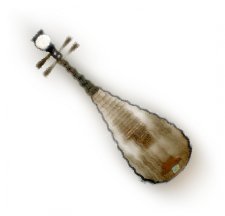Soushenji 389 translation: A Ghost Plays the Pipa
搜神記:鬼鼓琵琶 (三八九)
This is a translation and annotation of text No. 381 in 搜神記 (Soushenji – ‘In Search of the Supernatural’), a collection of strange happenings compiled by 干寶 (Gan Bao) in the 4th century C.E.
In order to be useful to people studying the text, this translation aims to be literal and close to the original.

鬼鼓琵琶 Guǐ Gǔ Pípá [ghost] [strike] [_pi_] [_pa_] A Ghost Plays the Pipa
吳赤烏三年, Wú Chìwū sān nián, [_Wu_] [_Chi_] [_Wu_] [three] [year] In the third year of the Chiwu reign of of Wu,
句章楊度至餘姚。 Jùzhāng Yáng Dù zhì Yúyáo. [_Ju_] [_Zhang_] [_Yang_] [_Du_] [to] [_Yu_] [_Yao_] Yang Du of Juzhang was going to Yuyao;
夜行, Yèxíng, [night] [travel], he was travelling by night,
有一少年持琵琶求寄載, yǒu yī shàonián chí pípá qiú jì zài, [have] [a] [few] [year] [hold] [_pi_] [_pa_] [seek] [lodge] [carry] and a youth carrying a pipa asked to ride with him;
度受之。 Dù shòu zhī. [_Du_] [accept] [him] Yang Du accepted.
鼓琵琶數十曲, Gǔ pípá shù shí qū, [strike] [pi] [pa] [several] [ten] [song] The youth played dozens of songs;
曲畢,乃吐舌擘目, qū bì, nǎi tǔ shé bāi mù, [song] [finish], [then] [put out] [tongue] [break] [eye] when the songs were finished, he stuck out his tongue and widened his eyes,
以怖度而去。 yǐ bù Dù ér qù. [so as to] [scare] [_Du_] [and] [go] to scare Yang Du, and then he disappeared.
復行二十里許, Fù xíng èrshí lǐ xǔ, [again] [travel] [two] [ten] [li] [perhaps] Yang Du went on for perhaps another twenty li,
又見一老父。 yòu jiàn yī lǎofù. [then] [see] [an] [old] [man] and then saw an old man.
自云姓王名戒。 Zì yún xìng Wáng míng Jiè. [self] [say] [surname] [_Wang_] [name] [_Jie_] He said he was called Wang Jie.
因復載之。 Yīn fù zài zhī. [thereupon] [again] [load] [him] Yang Du then let him ride on the carriage, too.
謂曰:「鬼工鼓琵琶,甚哀。」 Wèi yuē:`Guǐ gōng gǔ pípá, shén āi.' [speak] [say]: "[ghost] [skill] [strike] [pi] [pa], [extremely] [plaintive]" He said: "There was a ghost who played the pipa very movingly."
戒曰:「我亦能鼓。」 Jiè yuē:`Wǒ yì néng gǔ.' [_Jie_] [say]: '[I] [also] [can] [strike]' Wang Jie said: "I can play, too."
即是向鬼。 Jí shì xiàng guǐ. [indeed] [is] [before] [ghost] Indeed, it was the ghost from before.
復擘眼吐舌, Fù bāi yǎn tǔ shé, [again] [break] [eye] [put out] [tongue] Again it stuck out its tongue and widened its eyes,
度怖幾死。 Dù bù jǐ sǐ. [_Du_] [scare] [almost] [die] and Yang Du was almost frightened to death.
If you notice a mistake or disagree with the translation, please comment below to improve this resource.__
Useful links
- Full original text of 搜神記 (from Project Gutenberg)
- [In Search of the Supernatural: The Written Record - Amazon](http://www.amazon.com/exec/obidos/ASIN/0804725063/easasistu-20" rel="external nofollow “In Search of the Supernatural: The Written Record [Hardcover]")
